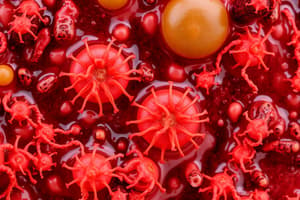Podcast
Questions and Answers
What factors may prevent a microbe from multiplying at a particular anatomic site?
What factors may prevent a microbe from multiplying at a particular anatomic site?
- Presence of reagents to facilitate multiplication
- Absence of factors required for microbial growth
- Lack of necessary warmth, moisture, and nutrients (correct)
- Presence of necessary warmth, moisture, and nutrients
What must many pathogens do before they are able to multiply and cause damage?
What must many pathogens do before they are able to multiply and cause damage?
- Attach to specific receptor sites (correct)
- Create new receptor sites
- Destroy the receptor sites
- Avoid receptor sites at all costs
What is an example of microbial antagonism in the context of immunity?
What is an example of microbial antagonism in the context of immunity?
- Absence of antibodies in the host
- Host's immune response weakening over time
- Presence of necessary nutrients for pathogen growth
- Indigenous microbiota producing bacteriocins (correct)
How does an individual's nutritional status influence the outcome of a pathogen-host encounter?
How does an individual's nutritional status influence the outcome of a pathogen-host encounter?
Which factor can engulf and destroy a pathogen before it multiplies, invades, and causes disease?
Which factor can engulf and destroy a pathogen before it multiplies, invades, and causes disease?
Why is the word 'infection' sometimes used as a synonym for infectious disease?
Why is the word 'infection' sometimes used as a synonym for infectious disease?
What does pathogenicity refer to?
What does pathogenicity refer to?
Why might someone be infected with a pathogen but not develop the infectious disease caused by that pathogen?
Why might someone be infected with a pathogen but not develop the infectious disease caused by that pathogen?
What does a pathologist specialize in?
What does a pathologist specialize in?
Why might some people not get sick even after being exposed to a pathogen?
Why might some people not get sick even after being exposed to a pathogen?
What does infectious disease refer to?
What does infectious disease refer to?
What is the main reason why phagocytes are unable to attach to encapsulated bacteria?
What is the main reason why phagocytes are unable to attach to encapsulated bacteria?
What is the consequence of encapsulated bacteria not being ingested by phagocytes?
What is the consequence of encapsulated bacteria not being ingested by phagocytes?
Which of the following is an example of an encapsulated bacterium mentioned in the text?
Which of the following is an example of an encapsulated bacterium mentioned in the text?
What is the function of flagella in bacteria according to the text?
What is the function of flagella in bacteria according to the text?
Which of the following is NOT a characteristic of coagulase produced by S. aureus?
Which of the following is NOT a characteristic of coagulase produced by S. aureus?
What is the role of kinases produced by pathogens?
What is the role of kinases produced by pathogens?
Flashcards are hidden until you start studying




